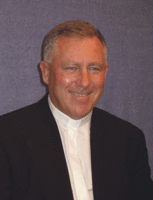Cardinal John Dew
Opinion
Cardinal John Dew
The late Brother Roger, of the ecumenical Taizé Community, once said ‘mercy is the only climate in which we meet God’.
Analysts say the word ‘mercy’ is the word Pope Francis uses the most; and he has now announced the Year of Mercy, 8 December 2015 through to 20 November 2016.
He begins his letter announcing the Year of Mercy by saying ‘Jesus Christ is the face of the Father’s mercy. These words might well sum up the mystery of the Christian faith.’ (Misericordiae Vultus, 1).
When this Year of Mercy was announced, several people asked me if this meant there was going to be another big push for more frequent use of the Sacrament of Reconciliation. Yes, I think it does mean that. But it also means much more than that.
In his earlier writing, the apostolic exhortation Evangelli Gaudium – The Joy of the Gospel – the Pope insisted mercy should be characteristic of everything the Church does. He was telling us we should make mercy the central reality of the Church’s life and mission; that our whole attitude towards others should be one of mercy, welcoming, acceptance and forgiveness.
I would love everyone – and I encourage everyone – to read the Pope’s Misericordiae Vultus. It is easily found on the Vatican website and is wonderful material for prayer and reflection.
If we learn to live in a climate of mercy we will reflect God to one another.
Remember those words from the finale of Les Miserables and the song that became very popular, ‘To love another person is to see the face of God’. When we show love, mercy, forgiveness, and acceptance of another we both see the face of God.
In one part of this document, Pope Francis reminds us of something many of us learnt and were encouraged to live by, and which we don’t hear so much of these days. I am speaking of the corporal and spiritual works of mercy. He writes: ‘It is my burning desire that, during this Jubilee, the Christian people may reflect on the corporal and spiritual works of mercy. It will be a way to reawaken our conscience, too often grown dull in the face of poverty. And let us enter more deeply into the heart of the Gospel where the poor have a special experience of
God’s mercy. Jesus introduces us to these works of mercy in his preaching so that we can know whether or not we are living as his disciples. Let us rediscover these corporal works of mercy: to feed the hungry, give drink to the thirsty, clothe the naked, welcome the stranger, heal the sick, visit the imprisoned, and bury the dead.
And let us not forget the spiritual works of mercy: to counsel the doubtful, instruct the ignorant, admonish sinners, comfort the afflicted, forgive offences, bear patiently those who do us ill, and pray for the living and the dead.’ MV15.
The corporal and spiritual works of mercy are not out of date, they are not old-fashioned, but are needed as much today as ever. When we live them we are creating the climate of mercy in which we meet God.
In this Year of Mercy we are told this will be the opportune moment to change our lives!
It will be a time to allow our hearts to be touched! The Council of Priests and the archdiocesan Pastoral Council have begun to plan events and ceremonies for the Year of Mercy.
The opening of the year will be at the Cathedral of the Sacred Heart in Wellington on Tuesday 8 December – our Diocesan Feast day – and there will be many other events around the Archdiocese.
However, the year will only be one of grace and growth when we all try to make it such; when in our homes, families, schools, work-places, the places where we recreate and socialise, we consciously try to create a climate of mercy so we truly meet God.
As Pope Francis says, ‘Mercy is the only climate in which we meet God’, as we intentionally and willfully try to create that climate we become ‘Merciful like the Father’.